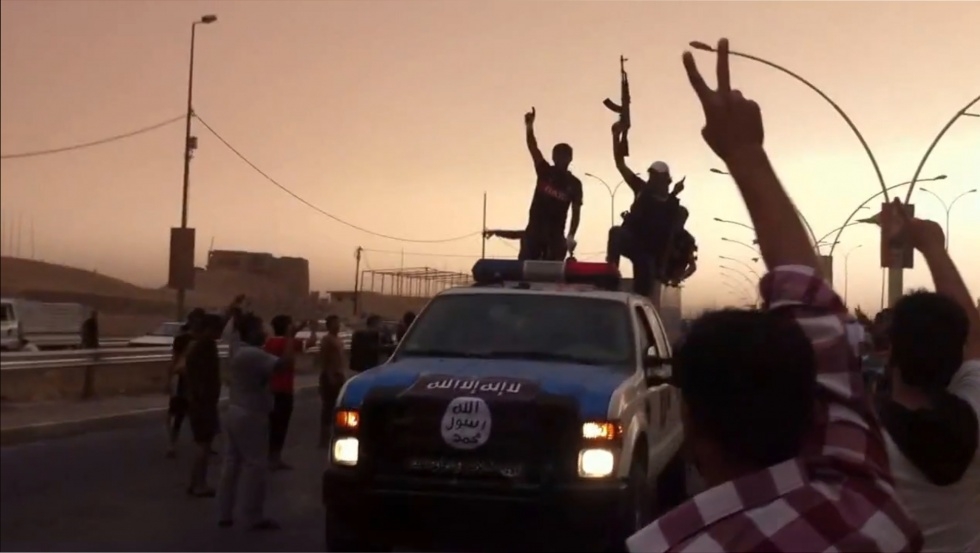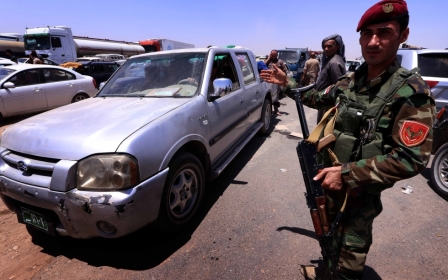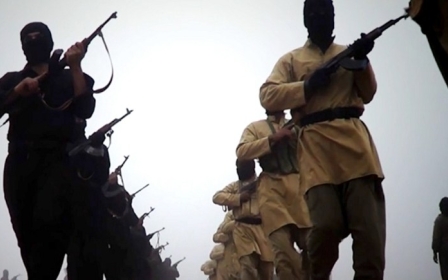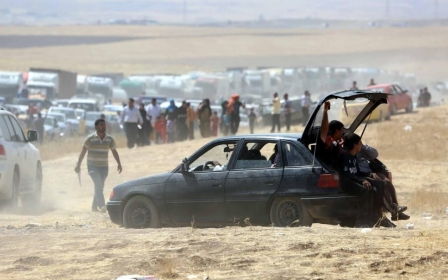Iraq: ISIL takeover or anti-Maliki uprising?

Militants from the Islamic State of Iraq and the Levant (ISIL) are not acting alone in taking over Iraq’s cities but rather form part of a coalition seeking to undo the sectarian policies of Prime Minister Nuri al-Maliki’s government, say Iraqi observers and local residents.
When armed men overran the northern city of Mosul last week, before moving south to control large swathes of Salahuddin province, widespread reports attributed responsibility to ISIL. While the group’s presence in the takeover is not disputed, some observers say its role is being overplayed.
“Western powers, Arab countries and even Iran are making a mistake when they brand what is happening in Iraq as the work of ISIL,” said Sabah al-Mokhtar, an Iraqi-born observer who heads the Arab Lawyers Association in London.
“The current takeover of cities was planned and predominantly carried out by the ‘Military Councils in Iraq’, which are composed of Iraqis in cities that have suffered from sectarian oppression since the 2003 US-led invasion of their country,” he added.
“There are Iraqi fighters led by senior officers in the former Iraqi army, who were fired once the US took control of Iraq,” he added.
Saddam's generals
There have been reports supporting this view, with specialist Iraqi reporting site Niqash noting speculation among locals that one of former leader Saddam Hussein’s top generals was involved in the takeover of Mosul. Izzat Ibrahim al-Douri, formerly a senior Baathist military officer who served as vice president under Hussein, reportedly joined forces with ISIL to mount the takeover.
“These groups [ISIL and the Baathists] were unified by the same goal, which is getting rid of this sectarian government, ending this corrupt army and negotiating to form the Sunni region,” Abu Karam, a senior Baathist leader, told the New York Times last week.
Arab media has reported that Hashem al-Jammas, a veteran officer who served in Saddam's army, has been appointed the governor of Mosul. He served in the Iraq-Iran war, as well as participating in the invasion of Kuwait, and is said to hold a key role in the Military Councils of Iraq.
One resident of Hussein’s hometown Tikrit, which is now under the control of various armed groups, says talk of an ISIL rout is wide of the mark.
“Some people say it is ISIL but there is a coalition of people who oppose the government,” Mahjoub, a resident of Tikrit, told MEE. “There are members of the Baath Party and other Islamist groups, the ISIL people are in the minority,” he added.
Although Douri never appeared for a rumoured speech in Mosul last week, posters of former leader Hussein are now said to be plastered around the city. Another group said to have played a role in the city’s takeover is Jaysh al-Tariqa al-Naqshbandia (JRTN), an armed Sufi group with strong links to the Baath Party.
“ISIL is not alone on this battlefield,” Rayan Ahmad, member of the JRTN, told Niqash. “There are other factions and organisations coordinating with it, for the first time since 2003 – and all have the goal of ending the political process brought about by the US occupiers,” he added.
Analysts, however, say the presence of JRTN is being manipulated to suit the political aims of both ISIL and Maliki’s government in Baghdad.
“The Naqshbandi Army are proving useful to both sides in this conflict,” said Cathrin Schaer, editor-in-chief of Niqash. “ISIL are able to use them as something of a front, to win over the hearts and minds of local people in Mosul, where a Baathist, anti-Maliki and pro-Sunni message appeals to the mostly Sunni population who have felt oppressed by the army for a long time.”
“Maliki himself can use the Baathist threat to encourage the Shiites in Iraq to get behind him, as over the years he’s often talked about how former Baath Party members were out to get him,” she added.
It isn’t clear how many groups are involved in the fighting but at least two others have been identified by locals, including Ansar al-Sunna, an armed Sunni group accused of carrying out bombing attacks in the Kurdish city of Irbil during 2004. The other is the Mujahideen Army, a group formed to oppose the 2003 US-led invasion that gained notoriety for executing eight American security contractors in 2004.
ISIL's alliances
The relatively low numbers of ISIL fighters, estimated to be in the low thousands, has led some to speculate about their need for alliances if they are to retain control over large areas of the country.
“There is an agreement among these various groups to hold the ground gained, as ISIL cannot do this alone with their small number of fighters,” said Fareed Sabri, former spokesperson for the Iraqi Islamic Party 2006-08.
Local residents have told MEE that Mosul is now under the control of local people, with foreign fighters said to have moved on.
“At first we noticed the presence of foreign armed men, but now it seems they have disappeared from Mosul,” said Um Abdullah, a widow who has returned to Mosul after initially fleeing last week. “Iraqis, mainly from Mosul, are in charge of the city,” she added.
Um Zaid, an Iraqi originally from Mosul, said those who took charge of the city used to serve in Hussein’s Republican Guards. She too told MEE there are no foreign gunmen in the city now, adding that they were only there in the beginning.
The impression among many Iraqis in Sunni areas is that the foreign gunmen, who include members of ISIL, only take part in the capture of cities and leave to the next target once Sunni control is established. In these communities there is increasing currency in the idea that this offensive is not led by ISIL, but is predominantly the work of Iraqi Sunni figures.
Support for a so-called “Sunni uprising” is strong among a community vilified by a sectarian government in Baghdad, according to Iraqi observers.
“No Sunni in Iraq is safe,” said Sabri, the former Iraqi Islamic Party spokesperson. “Everyday people are being kidnapped and killed by Maliki’s security forces and nothing has been done in the past 10 years to stop this war of attrition against the Sunni community.”
“It’s a very dangerous situation when Sunnis feel safer with ISIL in their community rather than the government forces,” he added.
Fears of a sectarian war have risen since top Shiite leader Grand Ayatollah Ali al-Sistani issued a call for Iraqi citizens to take up arms and fight against the “terrorists”, while community divisions have been laid bare by a Sunni religious leader who said people were rising up against Maliki’s “dictatorship”.
A 'broad movement'
Sunni Grand Mufti Sheikh Rafia al-Rifaai told Middle East news site Zaman al-Wasal that the offensive in Mosul and Tikrit is not an ISIL takeover but is a “broad movement from all revolutionaries aiming to gain control over more areas to rout Maliki’s sectarian army”.
Sabri says the international community must understand the role Maliki has played in this crisis and end support for his premiership if sectarian divisions are to be bridged.
“By supporting Maliki’s sectarian government the international community are fuelling terrorism, as groups such as ISIL will continue to gain ground,” he said. “If they continue to support Maliki there will be increased anger among 13 million [Sunni] people and this is a major problem.”
Others have urged the US and their allies to pursue a policy of political reconciliation beginning with a redrafting of the country’s constitution.
“They [the US] must learn from the past mistakes and support the restoration of an independent secular sovereign Iraq, which will be good for the Iraqi people as well as for the West who will do business with Iraq,” said Burhan al-Chalabi, former chair of the British Iraqi Foundation. “This can only be achieved by abolishing the sectarian constitution imposed by Viceroy Paul Brimmer on Iraq during the US occupation and begin a genuine process of democracy, not the sham that has been practised by Nouri al-Maliki to date.”
US President Barack Obama ruled out sending US troops to Iraq on Friday, saying he needs “several days” to formulate a strategy for their response to the crisis. He did, however, stress the need for Maliki’s government to resolve sectarian divisions.
“Any action that we may take to provide assistance to Iraqi security forces has to be joined by a serious and sincere effort by Iraq’s leaders to set aside sectarian differences, to promote stability and account for the legitimate interests of all of Iraq’s communities,” Obama said in a statement on the White House lawn.
The crisis itself shows no sign of abating, as fighting continues between government forces and Sunni militants across the country. Over the weekend bombing in Baghdad killed nine, while an attack on a Shia recruitment centre for volunteer fighters left six dead on Sunday.
Government forces have announced unverifiable gains in killing militants and it emerged on Monday afternoon that the town of Tal Afar in northern Iraq had been captured by armed groups. There is, however, little to suggest a reconciliation plan is being considered by Maliki.
Middle East Eye propose une couverture et une analyse indépendantes et incomparables du Moyen-Orient, de l’Afrique du Nord et d’autres régions du monde. Pour en savoir plus sur la reprise de ce contenu et les frais qui s’appliquent, veuillez remplir ce formulaire [en anglais]. Pour en savoir plus sur MEE, cliquez ici [en anglais].




